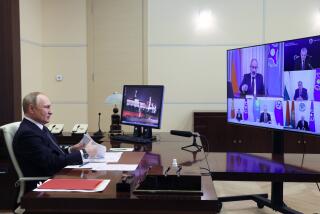Afghanistan Bleeds On
- Share via
Soviet leader Mikhail S. Gorbachev, announcing plans for a token withdrawal of about 6,000 Soviet troops from Afghanistan, said this week that the Kremlin wants to speed a political settlement that would allow the withdrawal of all Soviet forces from that torn and bleeding land. It is conceivable that this is a breakthrough. Unfortunately, though, Gorbachev gave no indication that he is prepared to make the kind of concessions that a political solution requires.
Gorbachev’s speech coincided with the resumption in Geneva of negotiations, through a United Nations intermediary, between Pakistan--from whose territory Afghan guerrillas operate--and the Soviet-imposed government of Afghanistan. Washington and Moscow are indirect participants.
The Soviets enjoy an overwhelming military superiority over the guerrillas. In the long run the Soviets, who have about 115,000 troops in Afghanistan, probably can wear down resistance and take control of the country. But the guerrillas still control large areas of Afghanistan, and the Soviets obviously must pay a heavy price for many years.
About 10,000 Soviet soldiers have died so far. The U.N. General Assembly, reflecting the anger of Muslim nations, regularly demands the withdrawal of Soviet troops. The occupation of Afghanistan is a major obstacle to the better relations that Moscow seeks with Washington and Peking.
Gorbachev has indicated several times that the Soviet Union would welcome a political settlement. But it is still not clear that he will accept peace on anything but his own terms.
Considerable progress, in fact, has been made in the U.N.-sponsored negotiations that began in 1982. But they have bogged down over the pace of a Soviet troop withdrawal and the related question of political power-sharing after the Soviets leave.
Outsiders know that it is unrealistic to expect the Soviets to withdraw unless they are assured that Afghanistan will not become an anti-Soviet bastion. But the Afghan people are not obliged to accept rule by Moscow-appointed stooges as a permanent condition. As President Zia ul-Haq of Pakistan said last winter, Afghanistan should become “a free, neutral and Islamic state friendly towards the Soviet Union.”
So far that hasn’t been good enough for the Soviets, who demand a guaranteed end to the guerrilla war but refuse to go beyond vague promises of political participation by refugees who return to Afghanistan.
If Gorbachev is seriously interested in a settlement, it should not be impossible to reconcile legitimate Soviet security concerns with the right of the Afghan people to run their own affairs.
More to Read
Sign up for Essential California
The most important California stories and recommendations in your inbox every morning.
You may occasionally receive promotional content from the Los Angeles Times.













